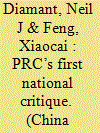|
|
|
Sort Order |
|
|
|
Items / Page
|
|
|
|
|
|
|
| Srl | Item |
| 1 |
ID:
103320


|
|
|
|
|
| Publication |
2011.
|
| Summary/Abstract |
This paper explores the unusually weak voice of Chinese war veterans in post-1949 politics society and culture. Although Chinese movies and television often feature military-related themes, it is rare to find frank and politicized depictions of China's military conflicts. In this respect, China departs sharply from the former Soviet Union-China's Leninist model for most of its formative years-as well as Vietnam, European inter-war fascist regimes and democracies. This paper argues that the relative weakness of authentic military voices in China can be traced to several peculiar features of modern Chinese history. The nature of warfare in China, as well as the absence of a national army, veteran organizations and a consensus over the legitimacy about China's wars, has led many to question the validity of veterans' claims for a higher political and cultural status. Rather than allow veterans the space to portray war as they experienced it, intellectual elites in various cultural and propaganda offices dominate national war memory, presenting a simplistic and artificial rendering of China's wars.
|
|
|
|
|
|
|
|
|
|
|
|
|
|
|
|
| 2 |
ID:
144372


|
|
|
|
|
| Summary/Abstract |
This article is the first detailed exposition of the “National Discussion of the Draft Constitution”. In mid-1954, Chinese engaged in a wide-ranging deliberation about political and social rights, the obligations of citizenship, state symbols, political institutions and ideology. Many asked penetrating and frequently prescient questions about law, citizenship, class and political power, and offered provocative suggestions for revision. Using archives and intra-Party publications, we argue that, for citizens, the constitutional discussion constituted the earliest national-level, semi-public exposé and critique of the entirety of CCP governing practices—a “dress rehearsal” for the 1956 Hundred Flowers Movement. For officials, the constitutional discussion provided an opportunity to deploy the coercive language of “state law” to overcome resistance to collectivization, and a tactic to deal with “unruly” citizens. We further suggest that the 1954 discussion set the terms of broad-based, but ultimately limited, constitutional critique from the 1950s until the present.
|
|
|
|
|
|
|
|
|
|
|
|
|
|
|
|
| 3 |
ID:
082033


|
|
|
|
|
| Publication |
2008.
|
| Summary/Abstract |
This article examines the organizational origins of political vulnerability among Chinese military veterans between 1949 and 2006. Recently declassified sources from urban and rural archives show that many veterans, even as they were officially considered core members of the ruling elite and hailed as the "flesh and blood of the revolution," nevertheless experienced frequent humiliation and discrimination; few citizens sympathized with their plight. The argument here is that much of this mistreatment can be traced to the failure of the state to provide veterans with the opportunity to organize in the context of either fraternal organizations or quasi-autonomous federations. In this respect, their predicament is notably different from their counterparts in democratic, fascist, or corporatist systems, or in other Leninist regimes. Why have veterans in Taiwan, Vietnam, and the former Soviet Union been allowed to form veterans organizations but veterans in the PRC-to their misfortune-have not? This article explains this anomaly.
|
|
|
|
|
|
|
|
|
|
|
|
|
|
|
|
|
|
|
|
|